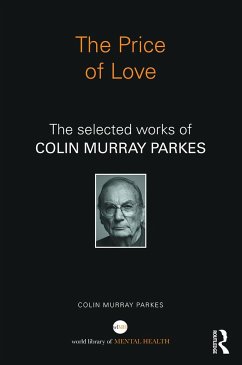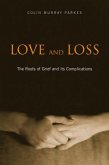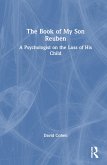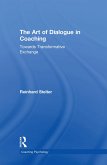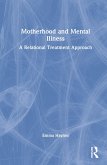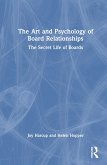- Gebundenes Buch
- Merkliste
- Auf die Merkliste
- Bewerten Bewerten
- Teilen
- Produkt teilen
- Produkterinnerung
- Produkterinnerung
Parkes presents papers which span the full extent of his career, covering and linking together our understanding of the five major areas of his work.
Andere Kunden interessierten sich auch für
![Love and Loss Love and Loss]() Colin Murray ParkesLove and Loss80,99 €
Colin Murray ParkesLove and Loss80,99 €![The Book of My Son Reuben The Book of My Son Reuben]() David CohenThe Book of My Son Reuben165,99 €
David CohenThe Book of My Son Reuben165,99 €![The Five Emotions That Stop Success in Coaches, Clients, and Creatives The Five Emotions That Stop Success in Coaches, Clients, and Creatives]() Rahti GorfienThe Five Emotions That Stop Success in Coaches, Clients, and Creatives160,99 €
Rahti GorfienThe Five Emotions That Stop Success in Coaches, Clients, and Creatives160,99 €![The Art of Dialogue in Coaching The Art of Dialogue in Coaching]() Reinhard StelterThe Art of Dialogue in Coaching150,99 €
Reinhard StelterThe Art of Dialogue in Coaching150,99 €![Motherhood and Mental Illness Motherhood and Mental Illness]() Emma HaynesMotherhood and Mental Illness170,99 €
Emma HaynesMotherhood and Mental Illness170,99 €![Group and Team Coaching Group and Team Coaching]() Christine ThorntonGroup and Team Coaching161,99 €
Christine ThorntonGroup and Team Coaching161,99 €![The Art and Psychology of Board Relationships The Art and Psychology of Board Relationships]() Joy HarcupThe Art and Psychology of Board Relationships160,99 €
Joy HarcupThe Art and Psychology of Board Relationships160,99 €-
-
-
Parkes presents papers which span the full extent of his career, covering and linking together our understanding of the five major areas of his work.
Hinweis: Dieser Artikel kann nur an eine deutsche Lieferadresse ausgeliefert werden.
Hinweis: Dieser Artikel kann nur an eine deutsche Lieferadresse ausgeliefert werden.
Produktdetails
- Produktdetails
- Verlag: Taylor & Francis
- Seitenzahl: 252
- Erscheinungstermin: 24. Juli 2014
- Englisch
- Abmessung: 234mm x 156mm x 16mm
- Gewicht: 531g
- ISBN-13: 9780415662710
- ISBN-10: 0415662710
- Artikelnr.: 41750072
- Herstellerkennzeichnung
- Libri GmbH
- Europaallee 1
- 36244 Bad Hersfeld
- gpsr@libri.de
- Verlag: Taylor & Francis
- Seitenzahl: 252
- Erscheinungstermin: 24. Juli 2014
- Englisch
- Abmessung: 234mm x 156mm x 16mm
- Gewicht: 531g
- ISBN-13: 9780415662710
- ISBN-10: 0415662710
- Artikelnr.: 41750072
- Herstellerkennzeichnung
- Libri GmbH
- Europaallee 1
- 36244 Bad Hersfeld
- gpsr@libri.de
Colin Murray Parkes, OBE, MD, FRCPsych, DL, is a psychiatrist, researcher and clinician who has pioneered development of psychological support for families facing the death of a family member. His recent work has focussed on traumatic bereavements with special reference to violent deaths, armed conflict and the cycle of violence. He is the author and editor of six previous books, including most recently Responses to Terrorism (Routledge, 2014).
Foreword. Acknowledgements. Introduction. Part 1. Love and Grief. 1.
Introduction. 2. "Seeking" and "Finding" a Lost Object: Evidence from
recent studies of the reaction to bereavement. 3. Comments on Dennis Klass'
Article "Developing a Cross-Cultural Model of Grief". 4. Evaluation of a
Bereavement Service. 5. Broken Heart: A Statistical Study of Increased
Mortality Among Widowers. 6. Guidelines for Conducting Ethical Bereavement
Research. 7. Bereavement: Understanding Grief across Cultures. 8.
Introduction (pp.1-6) and Conclusions (pp. 272-8) from Love and Loss: The
Roots of Grief and its Complications. 9. Complicated Grief: The debate over
a new DSM-V Diagnostic Category. 10. Dangerous Words. Part 2. Crisis,
Trauma and Transition. 11. Psychiatric Problems following Bereavement by
Murder or Manslaughter. 12. Psychosocial Transitions: A field for study.
13. What Becomes of Redundant World Models? 14. Bereavement Dissected: A
re-examination of the basic components influencing the reaction to loss.
15. Assumptions about Loss and Principles of Care. 16. An Experiment that
Failed: Services for Families in Crisis in Tower Hamlets: Perception of a
crisis service by referrers and users. Part 3. Death and Dying. 17.
Attachment and Autonomy at the End of Life. 18. Terminal Care: Evaluation
of in-patient service at St Christopher's Hospice. Part 4. Disasters. 19.
Bereavement following Disasters. 20. Psychosocial Effects of Disaster:
Birth Rate in Aberfan. 21. Help the Hospices Tsunami Project: Consultant's
Report and Recommendations. Part 5. War and Terrorism - Breaking the Cycle.
22. Grief and Reconciliation. 23. Genocide in Rwanda: Personal Reflections.
24. Reflections on Cruse' Response to 9/11. 25. Making and Breaking Cycles
of Violence. 26. Terrorism. Final Conclusions.
Introduction. 2. "Seeking" and "Finding" a Lost Object: Evidence from
recent studies of the reaction to bereavement. 3. Comments on Dennis Klass'
Article "Developing a Cross-Cultural Model of Grief". 4. Evaluation of a
Bereavement Service. 5. Broken Heart: A Statistical Study of Increased
Mortality Among Widowers. 6. Guidelines for Conducting Ethical Bereavement
Research. 7. Bereavement: Understanding Grief across Cultures. 8.
Introduction (pp.1-6) and Conclusions (pp. 272-8) from Love and Loss: The
Roots of Grief and its Complications. 9. Complicated Grief: The debate over
a new DSM-V Diagnostic Category. 10. Dangerous Words. Part 2. Crisis,
Trauma and Transition. 11. Psychiatric Problems following Bereavement by
Murder or Manslaughter. 12. Psychosocial Transitions: A field for study.
13. What Becomes of Redundant World Models? 14. Bereavement Dissected: A
re-examination of the basic components influencing the reaction to loss.
15. Assumptions about Loss and Principles of Care. 16. An Experiment that
Failed: Services for Families in Crisis in Tower Hamlets: Perception of a
crisis service by referrers and users. Part 3. Death and Dying. 17.
Attachment and Autonomy at the End of Life. 18. Terminal Care: Evaluation
of in-patient service at St Christopher's Hospice. Part 4. Disasters. 19.
Bereavement following Disasters. 20. Psychosocial Effects of Disaster:
Birth Rate in Aberfan. 21. Help the Hospices Tsunami Project: Consultant's
Report and Recommendations. Part 5. War and Terrorism - Breaking the Cycle.
22. Grief and Reconciliation. 23. Genocide in Rwanda: Personal Reflections.
24. Reflections on Cruse' Response to 9/11. 25. Making and Breaking Cycles
of Violence. 26. Terrorism. Final Conclusions.
Foreword. Acknowledgements. Introduction. Part 1. Love and Grief. 1.
Introduction. 2. "Seeking" and "Finding" a Lost Object: Evidence from
recent studies of the reaction to bereavement. 3. Comments on Dennis Klass'
Article "Developing a Cross-Cultural Model of Grief". 4. Evaluation of a
Bereavement Service. 5. Broken Heart: A Statistical Study of Increased
Mortality Among Widowers. 6. Guidelines for Conducting Ethical Bereavement
Research. 7. Bereavement: Understanding Grief across Cultures. 8.
Introduction (pp.1-6) and Conclusions (pp. 272-8) from Love and Loss: The
Roots of Grief and its Complications. 9. Complicated Grief: The debate over
a new DSM-V Diagnostic Category. 10. Dangerous Words. Part 2. Crisis,
Trauma and Transition. 11. Psychiatric Problems following Bereavement by
Murder or Manslaughter. 12. Psychosocial Transitions: A field for study.
13. What Becomes of Redundant World Models? 14. Bereavement Dissected: A
re-examination of the basic components influencing the reaction to loss.
15. Assumptions about Loss and Principles of Care. 16. An Experiment that
Failed: Services for Families in Crisis in Tower Hamlets: Perception of a
crisis service by referrers and users. Part 3. Death and Dying. 17.
Attachment and Autonomy at the End of Life. 18. Terminal Care: Evaluation
of in-patient service at St Christopher's Hospice. Part 4. Disasters. 19.
Bereavement following Disasters. 20. Psychosocial Effects of Disaster:
Birth Rate in Aberfan. 21. Help the Hospices Tsunami Project: Consultant's
Report and Recommendations. Part 5. War and Terrorism - Breaking the Cycle.
22. Grief and Reconciliation. 23. Genocide in Rwanda: Personal Reflections.
24. Reflections on Cruse' Response to 9/11. 25. Making and Breaking Cycles
of Violence. 26. Terrorism. Final Conclusions.
Introduction. 2. "Seeking" and "Finding" a Lost Object: Evidence from
recent studies of the reaction to bereavement. 3. Comments on Dennis Klass'
Article "Developing a Cross-Cultural Model of Grief". 4. Evaluation of a
Bereavement Service. 5. Broken Heart: A Statistical Study of Increased
Mortality Among Widowers. 6. Guidelines for Conducting Ethical Bereavement
Research. 7. Bereavement: Understanding Grief across Cultures. 8.
Introduction (pp.1-6) and Conclusions (pp. 272-8) from Love and Loss: The
Roots of Grief and its Complications. 9. Complicated Grief: The debate over
a new DSM-V Diagnostic Category. 10. Dangerous Words. Part 2. Crisis,
Trauma and Transition. 11. Psychiatric Problems following Bereavement by
Murder or Manslaughter. 12. Psychosocial Transitions: A field for study.
13. What Becomes of Redundant World Models? 14. Bereavement Dissected: A
re-examination of the basic components influencing the reaction to loss.
15. Assumptions about Loss and Principles of Care. 16. An Experiment that
Failed: Services for Families in Crisis in Tower Hamlets: Perception of a
crisis service by referrers and users. Part 3. Death and Dying. 17.
Attachment and Autonomy at the End of Life. 18. Terminal Care: Evaluation
of in-patient service at St Christopher's Hospice. Part 4. Disasters. 19.
Bereavement following Disasters. 20. Psychosocial Effects of Disaster:
Birth Rate in Aberfan. 21. Help the Hospices Tsunami Project: Consultant's
Report and Recommendations. Part 5. War and Terrorism - Breaking the Cycle.
22. Grief and Reconciliation. 23. Genocide in Rwanda: Personal Reflections.
24. Reflections on Cruse' Response to 9/11. 25. Making and Breaking Cycles
of Violence. 26. Terrorism. Final Conclusions.

